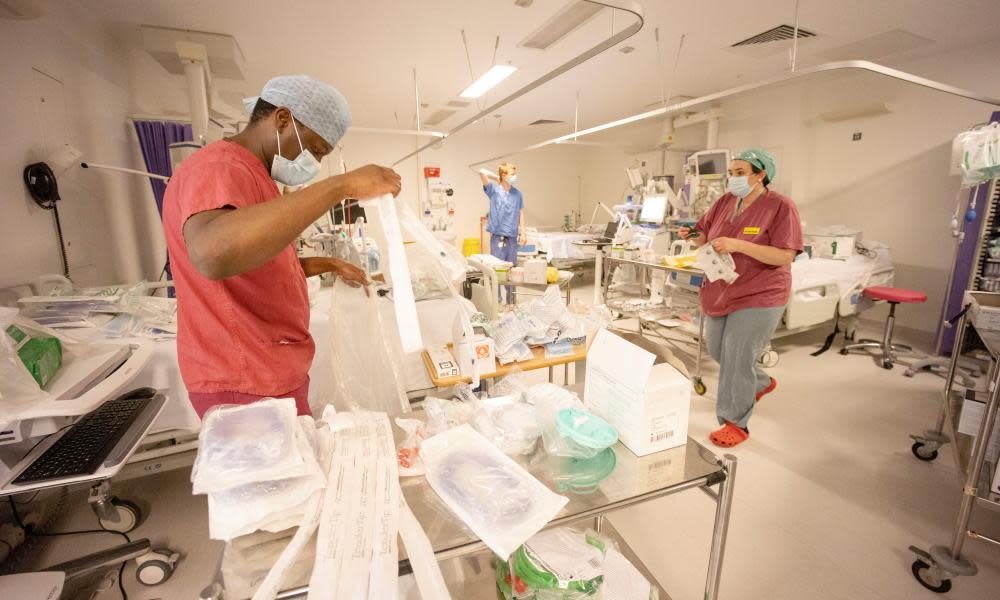NHS hospital bosses urge ministers to increase ICU beds in England

Hospital chiefs are urging ministers to expand the NHS’s supply of beds in intensive care units, which have borne the brunt of the Covid-19 pandemic over the last year.
It is unsafe for patients and unfair on frontline staff for the health service to continue with one of the lowest numbers of intensive care beds in Europe, they have told the Guardian.
ICUs across the UK have played a key role in treating more than 25,000 people whose health has been the worst affected by Covid since it struck last March. Patients at serious risk of death have received oxygen through either a ventilator or continuous positive airway pressure and also steroids in an attempt to keep them alive, with some spending many weeks in ICU.
Hospitals had to double and in some cases triple their stock of intensive care beds during the pandemic to cope with the number of patients. But they did so only by turning wards, operating theatres and recovery areas into makeshift mini-ICUs and redeploying staff from other areas to work there.
Related: NHS moving dozens of Covid patients a day in search for ICU beds
But hospital bosses in England say the NHS can no longer provide proper care with so few beds and are demanding the government order a review into whether it has enough. They want a major increase in both the number of beds and also medical specialists needed to staff them.
“Trusts’ experience of Covid-19 has strongly confirmed what we already knew: that the NHS is significantly short of intensive care capacity, both beds and staff,” Chris Hopson, the chief executive of NHS Providers, told the Guardian.
“We now need a formal review of what intensive care capacity is required going forward. It’s neither safe nor sensible to rely on NHS hospital trusts being able to double or triple their capacity at the drop of a hat as they’ve had to do so over the last two months, with all the disruption to other care and impossible burdens on staff that involves.
“The UK is towards the bottom of the European league table for intensive care beds per head of population. Whilst the UK has 7.3 intensive care beds per 100,000 people, Germany has 33.8 and the USA 34.3. We also have comparatively fewer than France, Italy, Australia and Spain.”
A series of international studies over the last decade have confirmed the gap between the UK and many other European or industrialised nations.
Hopson added: “A significant expansion in the number of intensive care beds needs to be a lasting legacy of Covid-19. That would ensure that the NHS can provide the right quality of intensive care to the sickest patients where access to that care is literally a matter of life and death.”
He urged ministers to not just instigate a review but also commit to implementing and funding whatever changes in bed numbers and increase in staffing it recommends.
The Faculty of Intensive Care Medicine (FICM), which represents doctors working in ICUs, backed the call. “FICM has been saying for years, long before Covid, that there needed to be a review of adult critical care capacity in the UK”, said Dr Alison Pittard, its chair.
“However, it is more complex than just increasing beds. As the pandemic has shown, staff are our most valuable resource and we cannot have more beds without a corresponding increase in trained staff ... not just intensive care doctors and nurses but also the entire multi-professional team such as physiotherapists, pharmacists, speech and language therapists and dieticians.”
default
FICM has been concerned for some time that, while demand for ICU beds had been rising by 4% a year from 2009 until Covid, the number of beds and staff had remained almost unchanged, which meant hospitals were less able to respond to the growing need for life or death care.
Hopson said the review would need to look at why some areas in the east, south-east and south-west of England have far fewer intensive care beds than the rest of the country. For example, the east of England had five beds open per 100,000 people in 2020-21 compared with 21 in London.
Acute shortages of intensive care beds during the recent surge of Covid forced the NHS to transfer record numbers of those with the disease to hospitals outside their home area. Some London hospitals were so overwhelmed that patients were taken as far afield as Newcastle, Yorkshire and the Midlands .
One intensive care consultant in London said they expected the capital to permanently increase its supply of intensive case beds by about 400 in the coming months but mainly by adding more beds that are used for “enhanced care” and post-operative monitoring, which need fewer staff.
“The plans I’ve heard are proportionate and pragmatic but it will be a fight for any money at all. Claps not cash. Plus ça change,” the doctor said.
A Department of Health and Social Care spokesperson said: “We are hugely grateful to all the NHS and care staff working tirelessly on the frontline of the pandemic.
“The government is determined to back the NHS in every possible way in its fight against this virus, investing £52bn this year and £20bn next. This is on top of £9.4bn capital funding to build and upgrade 40 new hospitals and £3bn earmarked for supporting recovery and reducing the NHS waiting list.
“We know how integral staffing is, and there are a record numbers of qualified doctors working in our NHS, with over 6,500 more doctors and over 10,500 more nurses compared to the previous year, and the government is on track to deliver 50,000 more nurses by the end of this parliament.”

 Yahoo Movies
Yahoo Movies 
